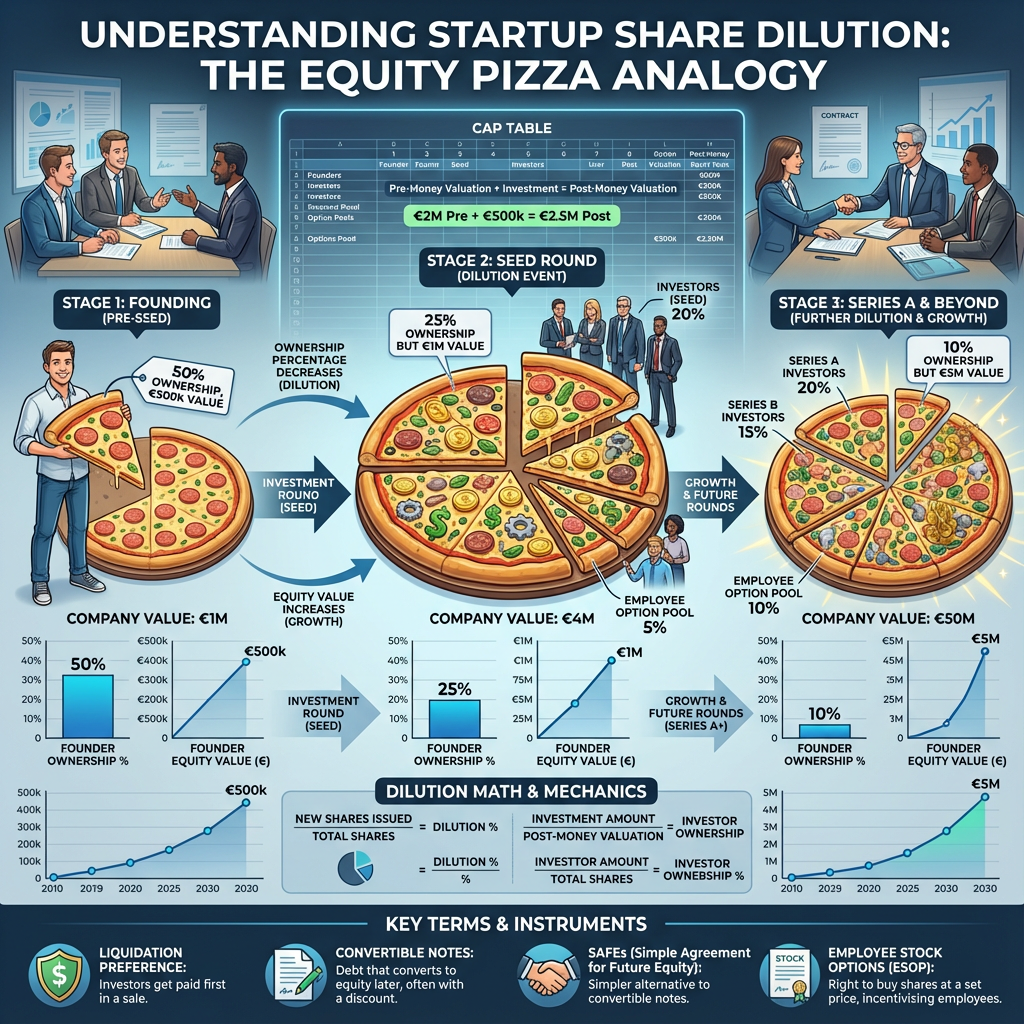This article is primarily written for early-stage startup founders in Ireland who are seeking government funding.
It's particularly relevant for entrepreneurs who are at the very beginning of their startup journey and need to understand the sequential funding options available through Irish government bodies.
Key Takeaways
- The Irish startup funding journey typically starts with LEO grants (Feasibility and Priming) before progressing to Enterprise Ireland's PSSF, offering a structured pathway for founders
- Most LEO grants require upfront spending and retrospective claiming, which can be challenging for early-stage startups with limited capital
- Enterprise Ireland's PSSF offers €50,000 or €100,000 through a Convertible Loan Note structure, avoiding immediate equity dilution
- The PSSF is effectively risk-free for founders as it's unsecured and only converts to equity upon specific trigger events
- The funding process becomes more substantial as you progress, starting from €15,000 (Feasibility) up to potentially €100,000 (PSSF)

Introduction
There is a lot of red tape that comes with trying to get funding or grants from the Irish government or city council (through the Local Enterprise Office).
Founders spend countless hours perfecting long forms just to claw back a few thousand euro in prototype expenses (assuming the founder can even afford to get it built in the first place!).
For all its issues however, Ireland does have a pretty solid startup support system in place.
The below is the ideal route you should take as an early stage startup to maximise the financial support available to you.
It doesn’t cover a number of small grants such as the TAME grant but just covers the ideal main route.

Local Enterprise Office
Each area of Ireland will have a Local Enterprise Office (LEO) responsible for it and each LEO offers two grants to early stage startups.
The LEO offers the following two main grants:
Feasibility Study Grant
The Feasibility Study Grant should be the first stop on everyone’s funding roadmap.
Here’s what it offers:
- Up to 50% of your costs covered (with a cap of €15,000) to help you figure out if your idea might be worth pursuing long-term.
- Funding for things like market research, building a first prototype, consultancy fees, and technical studies.
Basically, it's all about making sure you're not throwing money at a project that’s dead in the water before you even get started.
The only problem is that the grant is a “refund”, i.e. you have to spend the cash in the first place, and then claim it back.
Priming Grant
After the Feasibility Study Grant, the Priming Grant comes next and is aimed at startups that have already validated their idea, have confirmed that it is a feasible business opportunity and are ready to start growing.
The LEO usually expect companies to have an MVP by this point.
It’s only available for the first 18 months of a startup’s life.
It offers:
- Funding up to 50% of your eligible costs, capped at €150,000 to help cover critical early-stage expenses (although word on the street is that not many startups get more than €50k).
- Support for essentials like salaries, rental costs, marketing, equipment, and even training — all aimed at helping your business get moving.
In short, it’s designed to give your startup the financial boost it needs to go from idea to reality without breaking the bank.
As is the case with the Feasibility Study Grant, the Priming Grant requires you to actually pay most of the expenses up front and claim half of those expenses back afterwards.
I find this really unhelpful - it makes it really hard for startups that, even though they have a great idea, are just not at the revenue generating stage yet. Surely there must be a better way out there?
There are some differences with the Priming Grant such as the ability to get up to €15k for a salary of a new employee (in addition to the founders).
Once you have exhausted the LEO support, you can then move on to other supports that might be available to you. You can always skip the LEO grants if you want, but to the extent that they work for you, it really is ‘free’ money.
2. Enterprise Ireland
Pre-Seed Start Fund
Overview
The Pre-Seed Start Fund (“PSSF”) from Enterprise Ireland (“EI”) provides early-stage startups with investment options of either €50,000, or €100,000 available in two tranches of €50,000 each.
In addition to funding, successful applicants receive access to a Development Advisor and various support services from Enterprise Ireland, including mentorship sessions and access to the Market Research Centre.
The PSSF accepts applications at any time, without specific deadlines or application calls. This allows founders to apply when they feel ready, maximising the impact of the funding on their business.
Unlike the LEO grants, the PSSF doesn’t require you to pay any cash up front, it really is just a “loan”.
Application
Startups can apply for either €50,000 or €100,000 in investment.
The PSSF is specifically designed to support startups with the potential and ambition to scale globally.
The fund can be used to cover a variety of operational costs, such as salaries, consultancy fees, and product development expenses.
However, there are some restrictions, such as caps on legal fees and the exclusion of direct export aid costs like sales and marketing.
To apply, startups need to complete an online application form through the Enterprise Ireland platform and submit a video pitch in PowerPoint format.
The Legals
As part of the PSSF process, Enterprise Ireland doesn’t take any equity in your company. Instead, you sign up to a ‘Convertible Loan Note’ (“CLN”) with them.
This means that if certain events happen in the future, the CLN will then convert into shares of your company at that point.
Those certain events include (i) you selling your company, (ii) your company doing an IPO or (iii) taking another investment where you give out equity - also called a ‘priced round’.
The beauty about the CLN is that it doesn't put a valuation on your company - which is good in the very early days of a company because it’s really hard to actually put a value on most companies.
In contrast, a priced round does put a value on the company. For example, if someone gave you €100k for 10% of your company, then that results in a €1m valuation - simple maths.
In the early days, it’s usually better to delay the valuation until you really know what you have in your company.
Conversion
So if any of the above happens, the CLN will ‘convert’ into shares (equity) in your company.
How it works is that your company will end up with a ‘valuation’ depending on the amount it’s taking as an investment from the new investors, and Enterprise Ireland will be allowed to use the €100k (plus 3% interest) to buy shares in your company at a 20% discount to the new investors.
If you want to get into the weeds about the PSSF legals, we have a more detailed article here.
The PSSF is a great deal for founders, no matter what way you slice it.
Either you successfully raise more cash from angels or a VC and then you don't care that EI are getting a small discount on their investment, or else you bootstrap all the way to an exit and even if you exit for €100 million, the CLN will still only cost you a an extra few thousand at that stage - which is likely much better than handing over a chunk of equity.
If the company fails and you spend it all - it doesn’t matter because it’s an ‘unsecured’ loan, so in other words, your personal assets are completely safe.
Enterprise Ireland know the risks of investing in new companies and so potentially losing that cash just comes with the territory for them. 90% of startups fail, apparently, and EI know that too.
After PSSF there are other supports available to you from Enterprise Ireland but for the earliest stages, the above three funding opportunities are all you need.
How can Open Forest Help?
After you apply for PSSF funding, you will go through a process with a Development Advisor and if you are successful, you are required to appoint legal advisors to work through the legal process with Enterprise Ireland’s solicitors.
Open Forest has an ongoing offer for all startups of €1,000 + VAT. We are 100% committed to giving the lowest prices possible.
We do that by relying on technology for as many of our processes as we can, and we avoid hiring legal staff and renting fancy legal offices.
If you are in the late stages of PSSF approval or have just been approved, reach out to us below and we can have the cash in your bank within 2-4 weeks from approval.

Stuart Connolly is a corporate barrister in Ireland and the UK since 2012.
He spent over a decade at Ireland's top law firms including Arthur Cox & William Fry.







